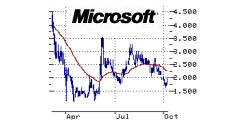Goldman Sachs demotes Microsoft stock
Boxed software at "end of era", according to financial analysts.

Financial institution Goldman Sachs has removed the software giant's stock from its elite list and said its business model was increasingly "outdated".
The investment bank said that Microsoft's future is uncertain despite the recent releases of Windows Vista and Office 2007, the latest version of its business software suite.
Goldman Sachs analysts said that the age of boxed software is potentially "the end of an era". In future, software will be delivered over the internet, an area in which Microsoft is investing heavily but is currently playing catch-up with the likes of Google. The search giant bundled its online business software - the Docs & Spreadsheets - into the Google Apps suite last August before releasing a Premier Edition in February of this year.
"Changing technology and business models in areas such as software-as-a-service, virtualisation and open source seek to diminish Microsoft's stranglehold on the desktop, which in turn significantly depletes the company's cash cow," the analysts wrote in a note to investors.
They also speculated that "Vista may be the last big operating system developed by the company", despite the fact that Microsoft has already begun work on its successor, codenamed Vienna.
The analysts also noted that Microsoft CEO Steve Ballmer recently warned that forecasts for revenue from Windows Vista in fiscal 2008 - Microsoft's next business year starting in July - were "overly aggressive".
"Investor nervousness remains high, particularly given uncertainty regarding spending plans in 2008 and recent negative management comments on Vista," the analysts wrote.
Get the ITPro. daily newsletter
Receive our latest news, industry updates, featured resources and more. Sign up today to receive our FREE report on AI cyber crime & security - newly updated for 2024.
While the analysts were casting their shadow, Microsoft had better news for investors. Timothy Chen, CEO of the company's China operation, said that he expects revenues in the world's most populous country to increase by 20 per cent in 2007 as a result of the release of its new products and increasing anti-piracy campaigns by the Chinese government.
He noted that only 30 per cent of Lenovo PCs currently sold contain illegally copied versions of Windows, compared to an estimated 90 per cent last year.




